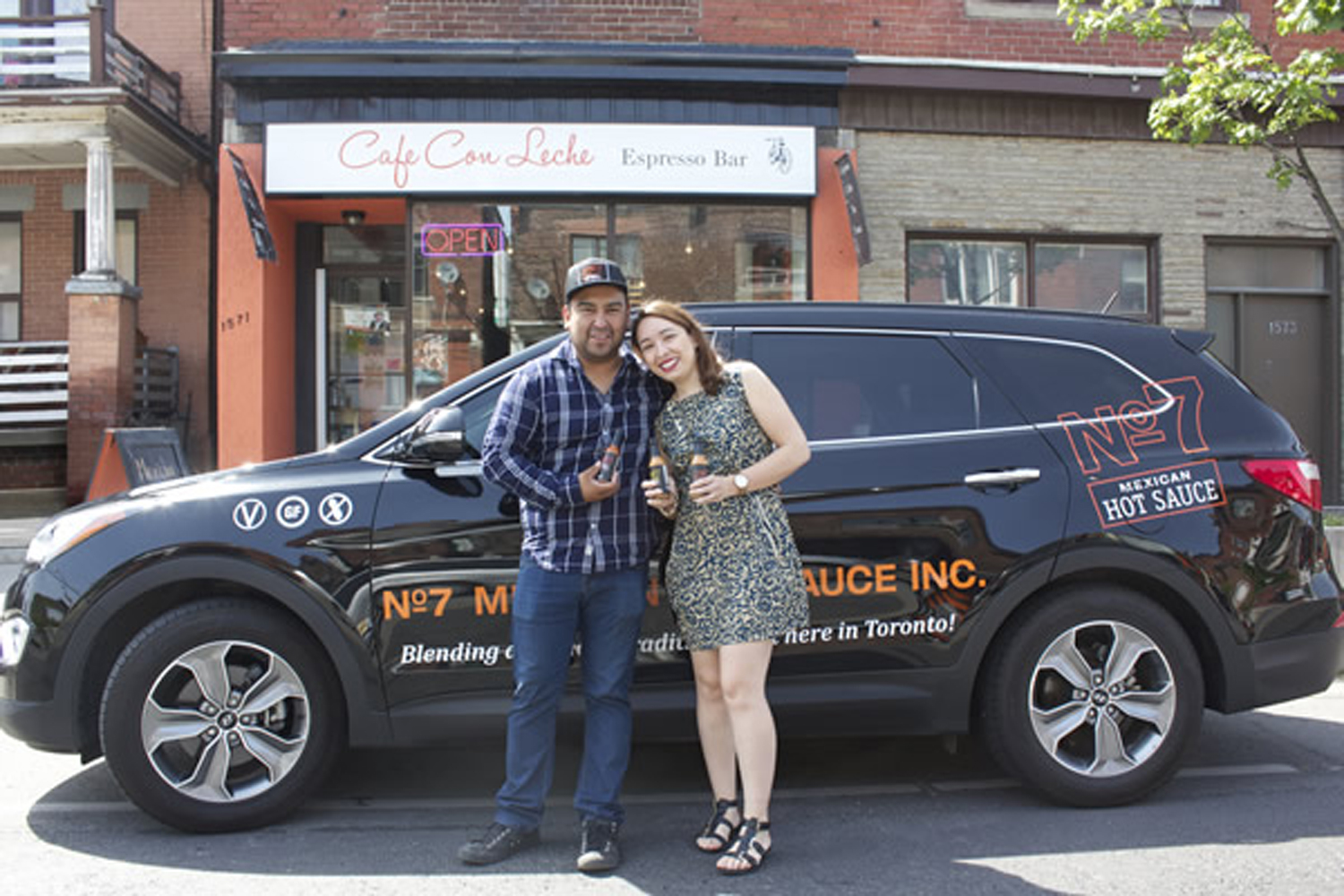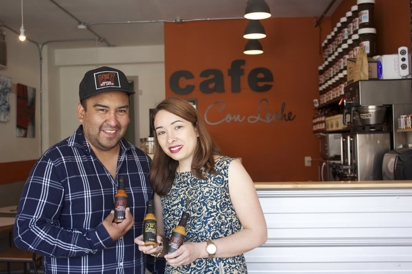No. 7 Mexican Hot Sauce Creates Bold Condiments Using Local Ingredients
When Carlos Flores was growing up in California there was always a bowl on the kitchen table that contained assorted vegetables and habanero chiles in a vinegar marinade. He and his family members would eat the spicy pickled condiment with their meals. Years later, Carlos Flores and his partner Sandra DaSilva created a business called No. 7 Mexican Hot Sauce, which is rooted in his mother’s traditional recipes for salsa picante and chiles en vinagre.
Carlos has rich stories and experiences that he recounts in precise detail. When he was a year old, his father left Mexico to work illegally in apple orchards in Washington State. He worked there for one year, sending money back to his wife in Mexico. Seeing vast opportunities for his family in the U.S., he returned to Mexico and convinced his wife to make the harrowing journey as illegal immigrants from Tijuana to California. Carlos was two years old and remembers being thrown into the trunk of a car that picked them up once they’d made it across the border.
His mom and dad started their new life in California with practically nothing and struggled immensely, yet were undeterred in their determination to have a secure future. They worked extraordinarily hard and Carlos’s father eventually became the owner of a wholesale flower business. The family was granted permanent residency status following President Reagan’s enactment of the Immigration Reform and Control Act of 1986, also known as the Simpson-Mazzoli Act.
When Carlos was ten, he asked his father for a case of flowers. His dad agreed (something tells me “no” is never the right reply to Carlos) and Carlos approached the owner of a gas station asking for permission to sell flowers there on Valentine’s Day. He made dozens of bouquets that quickly sold out; at a young age he was a quintessential entrepreneur, much like his dad.
As a teenager, however, Carlos was heavily into drugs and involved with gangs. He managed to extricate himself from that scene before his nineteenth birthday and subsequently mentored youth groups in L.A., San Diego, and finally Toronto after moving here in 1999.
Sandra and Carlos met at a youth group and married a year later, in early 2001, although Carlos actually asked Sandra to marry him on their first date. Sandra had grown up in a traditional Portuguese family in Toronto and she relates that the only condiments in her parents’ fridge were mustard and ketchup; imagine her reaction when Carlos secretly added hot sauce to her ketchup one day. Because they were out in public she wasn’t able to make a scene even though she felt like her mouth was exploding. Carlos can be a bit devilish.
Sandra trained as a Montessori school teacher and taught for five years after they got married. Carlos was in Canada on a visitor visa. After a year of marriage Sandra sponsored him, and five months later he was granted permanent residency status. In the meantime, Carlos found innovative ways to make money. During the summer, he and Sandra would go to the Ontario Food Terminal and buy cases of mangoes and strawberries. They would then drive to showroom and factory parking lots on Orfus Road, selling fruit from the trunk of their car at lunchtime. Carlos even helped Sandra sell Mary Kay cosmetics, recommending the perfect lipstick colours. Clearly, nothing fazes him.
Carlos then worked at a lot of construction jobs, including framing and dry-walling. He was a fast learner and liked working hard. Before they opened the café, Carlos and Sandra bought, renovated, and sold a few lofts. Not surprisingly, Carlos succeeded in everything he did.
After Carlos became a Canadian citizen in 2013, he and Sandra opened Café Con Leche on a rundown strip of Dupont near Lansdowne in Toronto. Carlos knew the location would be perfect, but friends and family were skeptical. Now the café is thriving and the area is becoming another food destination. The couple use coffee from Rufino Espresso/Classic Gourmet Coffee, an environmentally friendly roasting facility in Concord, and treats are sourced from local bakers like Cookie Martinez. Mexican paletas (ice pops) are supplied by Urban Acorn Catering, who use Carlos’s recipe. On a particularly hot day I was treated to a minty mojito paleta.
After opening the café, Carlos started toying around with making salsas picantes, the hot sauces he’d grown up with in Mexico and California. The first batch he made for sale in the café flew out the door in a flash, so he and Sandra made more. These unlabelled jars of hot sauce were really just a test to see if it was marketable. When the second batch also sold out, Carlos and Sandra sent the sauce out to a lab for nutritional analysis and they were told that it was impressive to have a product taste so good without the use of preservatives.
The name No. 7 Mexican Hot Sauce came about because of Carlos’s feelings about seven being a very powerful number. “No. 7” also indicates that most of his sauces are not very mild, but not very hot, either, on a scale of one to ten. Sandra created the logo with the distinctive orange and black colours that stands out on shelves.
With demand for their hot sauce confirmed, they gave two thousand jars of their homemade sauce to a distributor. A few weeks later they inquired about sales and were told that no one was interested. Shocked, Carlos and Sandra took back the jars and, just prior to Christmas 2013, they launched Hot Sauce Invasion, sampling and dropping off complimentary jars of the product to various corporations, including Sportsnet. No. 7 became a hit.
Having learned a lot from that experience, when they launched their full line of six hot sauces in 2014, Sandra and Carlos again loaded up their car and headed out to fairs, rib fests, and other events in and around Toronto almost every weekend to introduce people to No. 7. The pace was gruelling and, although sales were strong, they’ve decided to focus solely on Toronto markets and events this year.
Global sales of hot sauce are exploding. What makes Carlos’s different from many others on the market is that most of his are made using fresh raw ingredients. (The couple use locally grown fresh jalapeño and ghost peppers, along with imported fresh habaneros and dried chiles de arbol and pasilla peppers.) Carlos expected the sauce “would either taste good or bad” the first time he blended his mother’s recipe together using local ingredients; the result was delicious.
The “Habanero Original” No. 7 Mexican Hot Sauce was created using habaneros, cauliflower, carrots, garlic, oregano, bay leaves, cloves, water, and apple cider vinegar. This sauce and Carlos’s other flavours are free of sugar and salt, and are vegan and gluten-free. They’re known for their full mouth flavour rather than up-front, searing heat, which makes the various varieties highly distinguishable from one another.
Initially, Carlos bottled the sauce in wide-mouth jars, envisioning consumers spooning the sauce onto their food. Many stores liked the product but refused to carry it unless it was repackaged in a shaker bottle. Carlos and Sandra complied, and then hired a co-packer they are still working with. As luck would have it, the co-packer created the recipe for No. 7 Garlic Hot Sauce, now a bestseller. Sandra and Carlos developed the recipes for all of their other sauces.
Fiesta Farms was the first supermarket to carry No. 7 and The Butcher’s Son, the first small retailer to do so. The route to success has been challenging because when they started it was difficult to get advice about selling hot sauce. It was a road less travelled, but perseverance and asking questions have paid off.
For now, Carlos and Sandra have decided to concentrate on their top sellers—Habanero Original, Habanero Garlic, and Chile de Arbol—all now exclusively made by their co-packer. They grappled with this decision because they had still been making many of the sauces in the café, but storage was challenging and, since the sauces are gluten-free, they did not want to risk accidentally contaminating a batch with wheat products. Their other sauces—Jalapeño, Chile Pasilla, and Ghost Pepper—will be seasonally available at Café Con Leche, online, and at local food shows.
No. 7 hot sauces vary in their heat levels. The majority of Carlos and Sandra’s customers enjoy it on the hotter side, which fits their slogan, “Toronto Likes It Hot.” One customer puts the Original Habanero on ice cream; others add a favourite hot sauce to cocktails, cream cheese for dips, and wings, or as an addition to soups and stews. A traditional Mexican use is to sprinkle hot sauce, fresh lime juice, and salt, on fresh fruit.
You have to love being a food entrepreneur because, as Carlos says, it takes “energy, effort and money.” Once No. 7 Mexican Hot Sauce is on a particular store’s shelves, he and Sandra take care of their clients—making sure there is enough product and even straightening bottles so that they line up. Larger retailers have approached them to carry their sauces, so the opportunities for the couple to cautiously expand are there.
In the meantime, there is a lot to keep them busy. Café Con Leche is becoming more and more popular as people move into the area with their families or work at company headquarters like FreshBooks on Dupont. The Junction Triangle was not a sought-after location a few short years ago but Carlos and Sandra have made a welcome contribution to the neighborhood’s revival.
In my own kitchen, I recently used a test jar of No. 7 spice rub, combined it with No. 7 Chile Pasilla sauce, and made a dynamite roast chicken. And, as a great lover of potato chips, I’m hopeful that No. 7 Mexican Hot Sauce potato chips will make an appearance someday soon.
No. 7 Mexican Hot Sauce
(647) 748-3322





